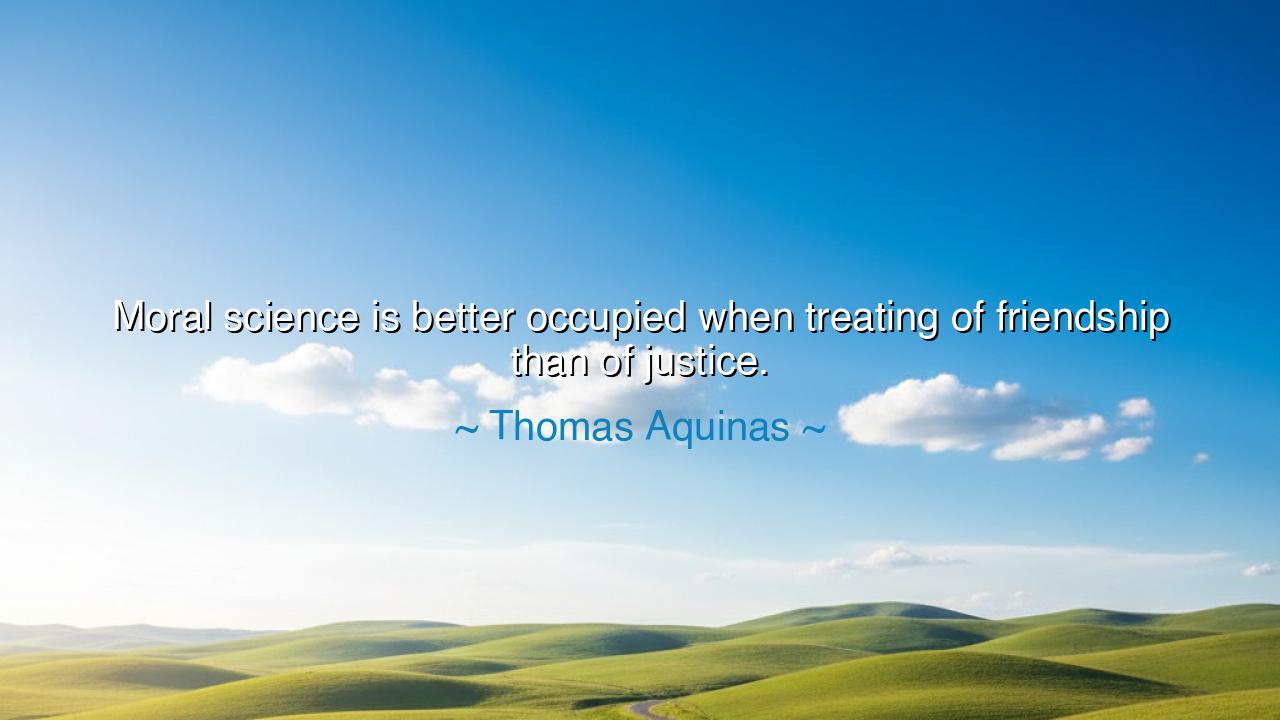
Moral science is better occupied when treating of friendship than






In the profound and luminous words of Thomas Aquinas, the great philosopher of faith and reason, we encounter a truth that reaches beyond the intellect and into the depths of the human heart: “Moral science is better occupied when treating of friendship than of justice.” At first glance, this may seem strange—after all, is not justice the pillar of all virtue, the foundation upon which order and goodness rest? Yet Aquinas, that wise doctor of the soul, knew that friendship lies even deeper, for it springs not from law but from love; not from duty, but from the free harmony of hearts. Justice may compel us to do what is right, but friendship moves us to do what is beautiful.
To grasp the meaning of his words, we must look to the origin of Aquinas’s thought. Living in the thirteenth century, he walked between two worlds: the world of divine revelation and the world of reason. Drawing upon Aristotle’s Nicomachean Ethics, he saw friendship as the crown of moral life—the living bond that makes community possible and lifts humanity toward the divine. For Aquinas, moral science, the study of how one ought to live, was not merely a pursuit of justice through law, but a search for goodness through relationship. Justice, he taught, is what we owe one another; friendship is what we give freely beyond what is owed. Thus, to cultivate friendship is to transcend mere fairness and enter into the realm of grace.
Indeed, justice divides the world neatly—it measures, it balances, it restores—but friendship unites. Where justice says, “This is yours, and this is mine,” friendship whispers, “What is mine is also yours.” In friendship, the barriers of the self dissolve, and the heart learns generosity without limit. Justice prevents harm; friendship kindles joy. Justice is the foundation of society; friendship is its soul. And so Aquinas, in his divine wisdom, declared that moral science—if it is to reach its highest calling—must study the art of friendship, for in friendship we find the perfection of love made human.
Look to history, and you will find countless proofs of his truth. Consider the bond between Cicero and Atticus, whose friendship endured across years of exile, war, and political turmoil. When Rome turned upon itself, and trust was shattered among men, their letters to one another remained filled with humor, care, and counsel. Cicero wrote that friendship “doubles joys and divides sorrows.” His words echo Aquinas’s teaching centuries later. For when men act only through justice, they preserve order; but when they act through friendship, they preserve humanity itself.
Or look to the example of Abraham Lincoln, who in the midst of civil war called even his enemies “friends.” He knew that the healing of a nation could not be achieved by justice alone, for justice punishes, but friendship redeems. It calls forth the better angels of our nature. To govern through friendship is to see in another not an opponent or debtor, but a fellow soul worthy of grace. Thus, friendship transforms justice into mercy, and duty into compassion.
There is also a divine echo in Aquinas’s thought, for he saw friendship with God as the ultimate goal of the moral life. To be a friend of God, he said, is to live in harmony with His will—not through fear of punishment, but through love of goodness. This, then, is the summit of virtue: not obedience to law, but friendship with the divine source of all law. When we are friends with God, we naturally act justly, for love fulfills what justice only commands.
And so, my child, learn from this ancient wisdom. Let your heart not be content with mere justice, which is the outer garment of virtue. Strive for friendship, which is its living heart. Seek not only to do right, but to love rightly. Where justice demands fairness, friendship offers kindness; where justice restores balance, friendship restores peace. Treat every soul you meet as a companion on the journey, not as a rival or a debtor.
In the end, remember this: justice builds walls; friendship builds bridges. Justice holds the world together by force; friendship holds it together by grace. Let your life be a school of friendship—cultivate empathy, listen with humility, forgive quickly, and give freely. For when moral science turns its gaze from the cold measure of law to the warm embrace of love, it ceases to be a rulebook for conduct and becomes instead a guide to the divine art of living well. And thus, as Aquinas taught, we draw nearer not only to virtue, but to heaven itself.






AAdministratorAdministrator
Welcome, honored guests. Please leave a comment, we will respond soon